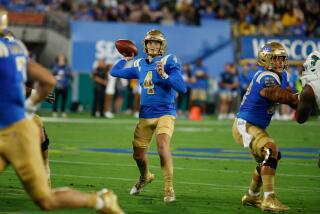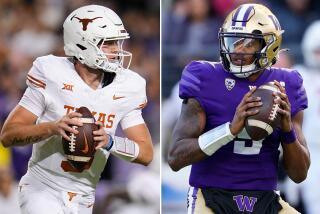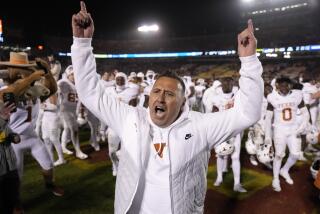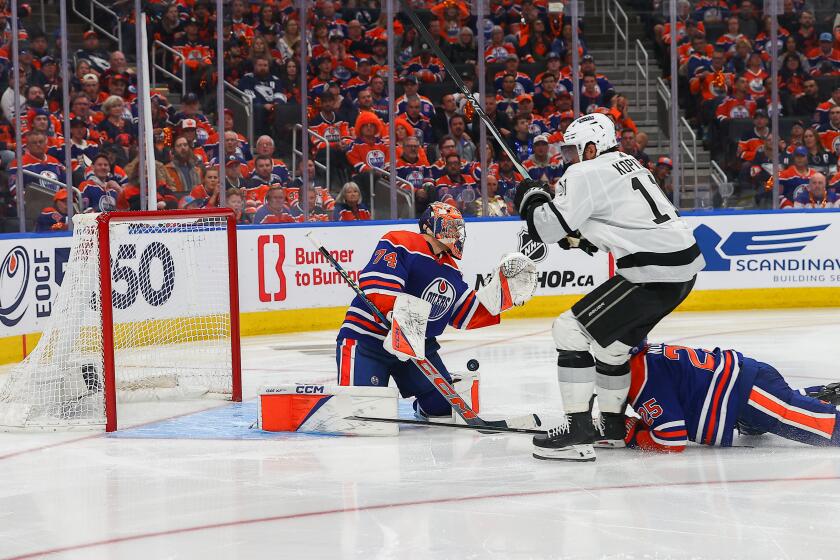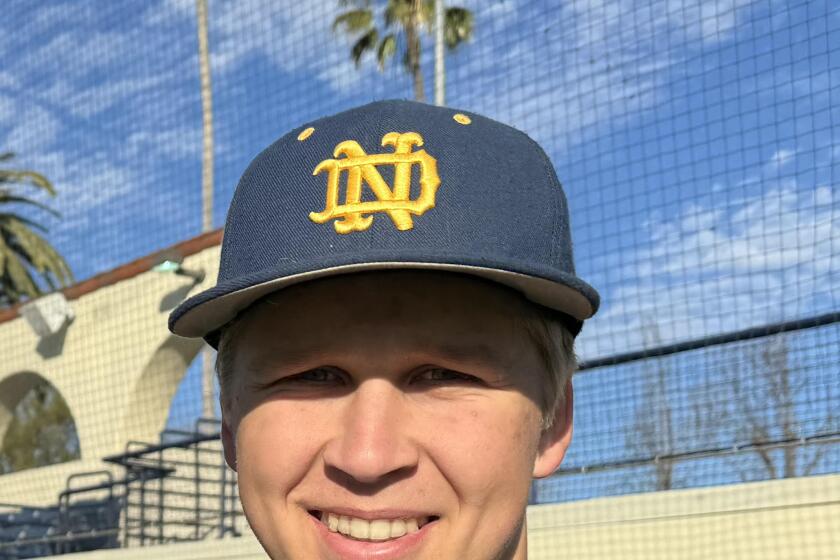Column: Injuries are already doing a number on national title contenders
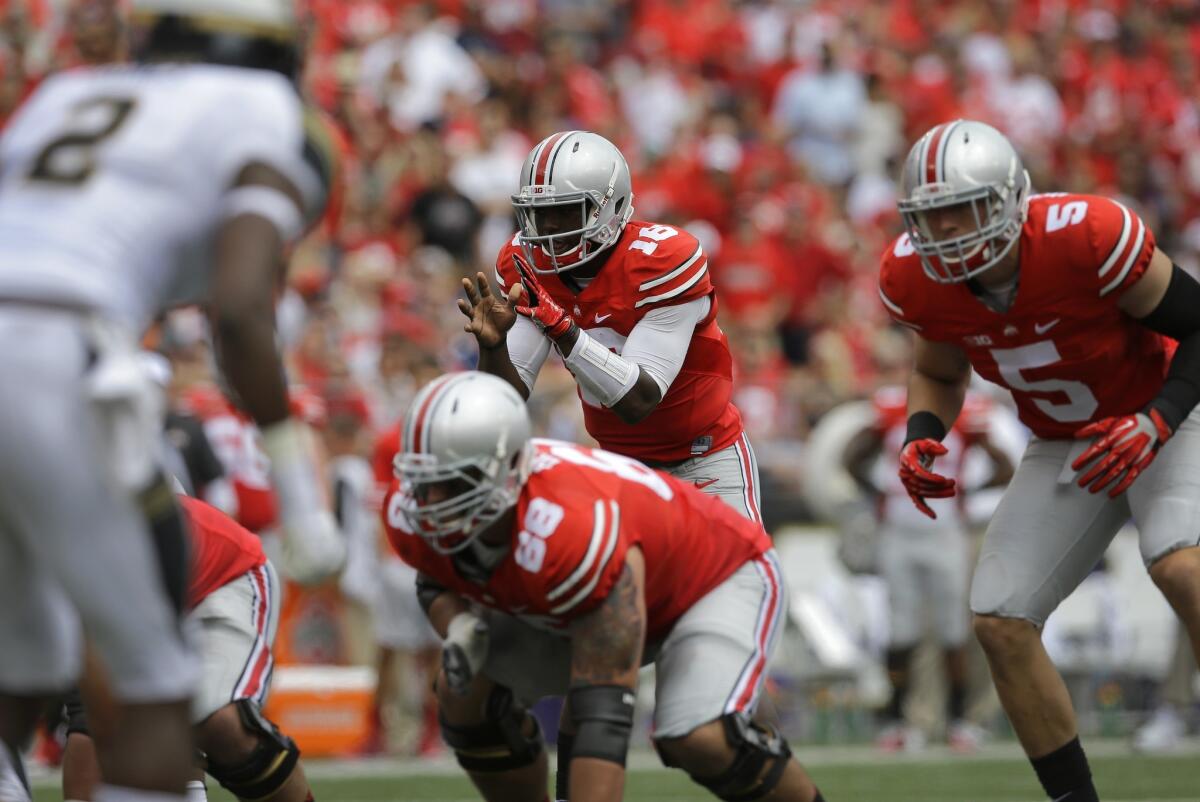
It’s seems clear after one week that the determining factor in the new college football playoff might not involve a touchdown, coach or even committee member Condoleezza Rice.
The ultimate decider could be a CT scan.
Sorry, this early season wrap is mostly about medical tape.
Ohio State quarterback Braxton Miller’s season-ending shoulder injury already has recalibrated the national title derby.
J.T. Barrett proved capable in Ohio State’s opening victory over Navy, but Miller is a two-time Big Ten Conference offensive player of the year.
Coach Urban Meyer debunked the notion that life simply goes on. “To say we’ll be fine ... we have to have someone pick that up,” Meyer said of Miller’s production. “We need 100-plus yards of offense. We didn’t have it Saturday.”
Miller’s injury did not occur in a vacuum. It affects Ohio State opponents, the Big Ten and the national landscape. The injury could help, or hurt, Michigan State’s chances depending on what happens to the Spartans on Saturday at Oregon.
UCLA opened at Virginia without two starting offensive linemen, and the lack of cohesion up front nearly busted the Bruins in their title-hope chops.
Now, though, an injury to Texas quarterback David Ash could help UCLA when it plays the Longhorns on Sept. 13. The Longhorns also lost starting center Dominic Espinosa to a broken foot.
Ash suffered concussion-syndrome symptoms in Texas’ opening win against North Texas. He will not play this week’ against Brigham Young and, in fact, may have played his last game as a Longhorn.
“We would never jeopardize a young man’s health just for the good of this football team,” first-year Texas Coach Charlie Strong said.
Ash’s story is heartbreaking. He seemed poised to lead Texas on a national title run last year until he got knocked out early by a head injury and missed the last nine games. You could argue Ash’s injury cost Mack Brown his job as coach of the Longhorns.
Elsewhere in Texas, Baylor’s national title hopes took a hit when star quarterback Bryce Petty was injured in Sunday’s 45-0 romp over Southern Methodist.
Petty reportedly cracked two vertebrae in his back and is day to day.
Mystery surrounds Wisconsin’s star tailback, Melvin Gordon, in the aftermath of an opening defeat to Louisiana State.
Wisconsin blew a 24-7 second-half lead and lost, 28-24, in part because Gordon carried only four times after halftime. He still finished with 140 yards in 16 carries.
It was reported that Gordon had sustained a hip-flexor injury in the second quarter, but Gordon said after the game he was fine.
“Melvin is going to say he’s absolutely fine,” Coach Gary Andersen said. “All I can do is go by what a trainer tells me. And he’s the professional. So if I put a kid in harm’s way because I don’t listen to a trainer, then I’ve got a major issue on my hands.”
The loss likely doomed the Badgers’ playoff chances at the same time it put LSU on a fast track.
Other things we’re tracking this week:
•Ifo Edpre-Olomu, Oregon’s All-America cornerback, missed three quarters of the Ducks’ opener with an ankle injury. Oregon plays host to Michigan State on Saturday in the biggest nonconference game of the new College Football Playoff era.
•Alabama got by West Virginia but lost defensive back Jarrick Williams to a broken foot and receiver DeAndrew White to a shoulder injury.
Injuries have a history of wreaking havoc on championship races. Florida State played the 1998 Bowl Championship Series title game with backup quarterback Marcus Outzen instead of Chris Weinke, who was out with a neck injury. Not surprisingly, Florida State foundered on offense and Tennessee won the title.
Two years ago, Notre Dame caught a break on its way to the title game when the Irish got to face USC the week after Matt Barkley suffered a season-ending injury against UCLA.
Nothing compares to 2007, though, when injuries helped LSU become the only two-loss champion of the BCS era. Oregon was ranked No. 2 and headed toward the title game when quarterback Dennis Dixon tried to play Nov. 15 at Arizona with a torn knee ligament.
Dixon’s knee buckled in the first half and Oregon’s season was over. The Ducks lost three straight games.
Later that season, No. 2 West Virginia was a home win against Pittsburgh from advancing to the BCS title game when star quarterback Pat White was knocked out of the game in the second quarter with a dislocated thumb. He tried to return in the fourth quarter but it was too late as Pittsburgh won a 13-9 shocker.
Arizona Coach Rich Rodriguez, who then was West Virginia’s coach, still reflects on White’s injury. “You always play the ‘what if?’ game,” he said.
Coaches have a mantra about not worrying about things they can’t control. “But you do,” Rodriguez said. “You worry about it every day.”
There is no sugarcoating the truth about losing an impact player. “You’re not going to be as good,” Rodriguez said.
Former Oklahoma coach Barry Switzer is on the short list of coaches to benefit from an injury to one of his own players.
Early in the 1985 season, after quarterback Troy Aikman broke his leg, Switzer switched to the wishbone offense and rode Jamelle Holieway to unexpected heights. Holieway remains the only true freshman to lead his team to a national title.
The injury worked out for UCLA too, which picked up Aikman as a transfer.
Usually, though, injuries promote only angst.
Here it is only September and we ask: What team’s heart (and other body parts) will be broken this season?
More to Read
Get our high school sports newsletter
Prep Rally is devoted to the SoCal high school sports experience, bringing you scores, stories and a behind-the-scenes look at what makes prep sports so popular.
You may occasionally receive promotional content from the Los Angeles Times.
